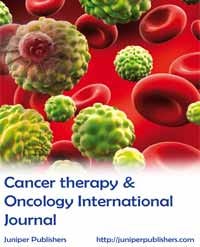Concerns of Gonadal Dysfunction Following Radioactive Iodine (RAI131) Treatment for Thyroid Cancer-Juniper Publishers
Cancer Therapy & Oncology-Juniper Publishers

Introduction
Differentiated thyroid cancer in young adults has an excellent prognosis with a long-term survival of over 90%. Radioactive iodine (RA1131) plays an important role in ablating thyroid remnants following thyroid surgery and is also used to treat residual, recurrent or metastatic disease. Its effects on the gonads and fertility are therefore of concern [1].
Keywords
RAI131; Fertility; Thyroid cancer
RA1131 and Male Fertility
After RA1131 administration, testicular irradiation derives from free RA1131 that circulates in the blood and accumulates in the bladder, gut and any functioning metastases close to the testis causing testicular exposure to radiation. Later, the irradiation derives from RA1131 iodoproteins released in blood from damaged thyroid remnants or metastatic lesions. Radio-iodinated thyroglobulin and thyroxine disappear from the blood with half-lives of 3.2 and 10.1 days respectively, contributing to prolonged irradiation time [2].
The radiation dose delivered to the testis after RA1131 therapy in euthyroid patient is approximately 0.1Gy/3.7GBq, so activity of 3.7 GBq (100mCi) should give 0.1Gy to the testis; while in hypothyroid patient it is 0.5–1Gy / 3.7GBq. It is increased in hypothyrodism due to reduced iodine renal clearance and subsequent prolonged exposure of the testis to relatively high RA1131 levels in blood and urine [3].
The effect of RA1131 on fertility varies from transient oligospermia to permanent azoospermia with or without Leydig cell dysfunction depending on total dose, thyroid state, duration of exposure to radiation and site of functioning thyroid metastases. Transient oligospermia can be expected with activity of 3.7 GBq. Permanent infertility can be expected in less than 10% of men treated with activities of 11GBq and in 90% of men treated with activities of 40 GBq [2].
In the context of fertility, the administration of radionuclides also raises concern because of their appearance in ejaculate. Sexually active males who have been treated with radioiodine are usually recommended to use contraception for 4 months as this period is greater than the life of a spermatozoon [1].
RA1131 and Female Fertility
Large studies on fertility, pregnancies and offspring from RA1131-treated female patients usually do not report significant adverse effects [4]. The preliminary finding of an increased number of miscarriages in pregnancies, starting within 1 year after treatment with high RA1131 dose in the study performed by Garsi et al. [5] was not confirmed when the case series was further extended by the same authors. Sporadic observations of malformations in children born within one year of RA1131 treatment are reported [6].


Comments
Post a Comment